1. Bond Proxies Get Hit
Utilities 10% Off Highs…Close below 200day.
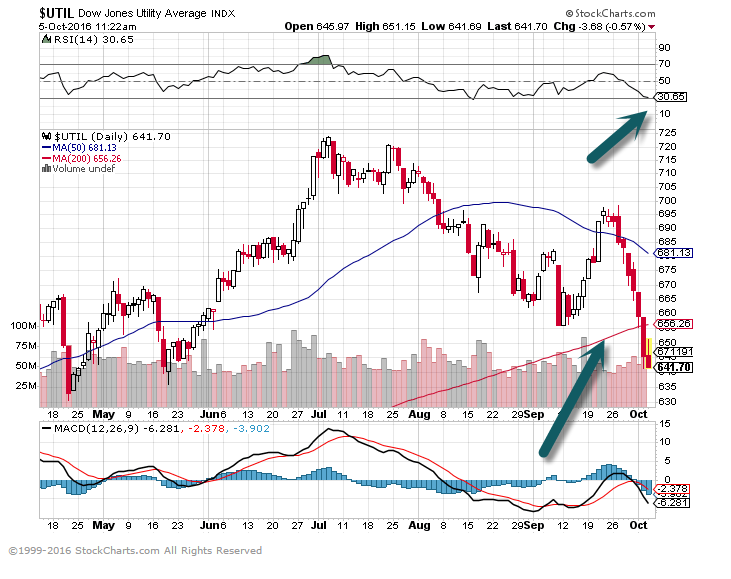
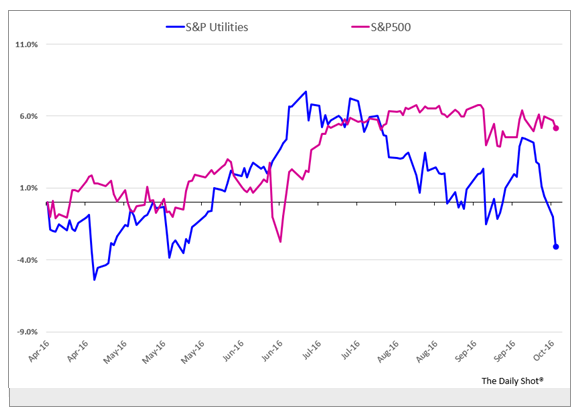
2. REIT Index…Closes Below 200day on Heavy Volume.
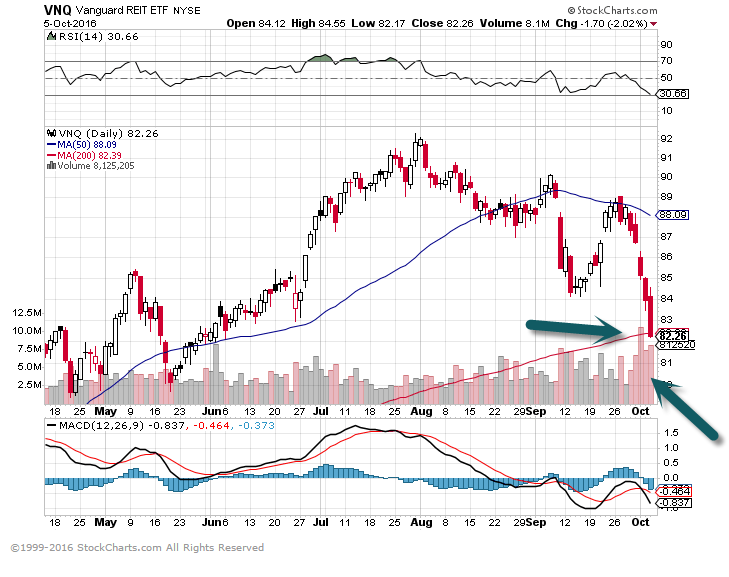
3. We have Mentioned Transports Lagging Multiple Times on Top 10…John Murphy Weighs In…
Transports Are on the Verge of Bullish Breakout — Rails Have Already Turned Up
John Murphy | October 01, 2016 at 09:52 PM
Once again, transportation stocks appear to be on the verge of a bullish breakout. Chart 1 shows Transportation Average iShares (IYT) on the verge of breaking through their April/September highs. Their relative strength ratio (top of chart) also appears to have bottomed. I recently showed buying in airlines and air freight. Rails, however, have been the strongest part of the transportation group and are leading it higher today. As I showed yesterday, transports are now outperforming utilities which is a positive sign. A transportation breakout would be another good sign for the market and the economy.
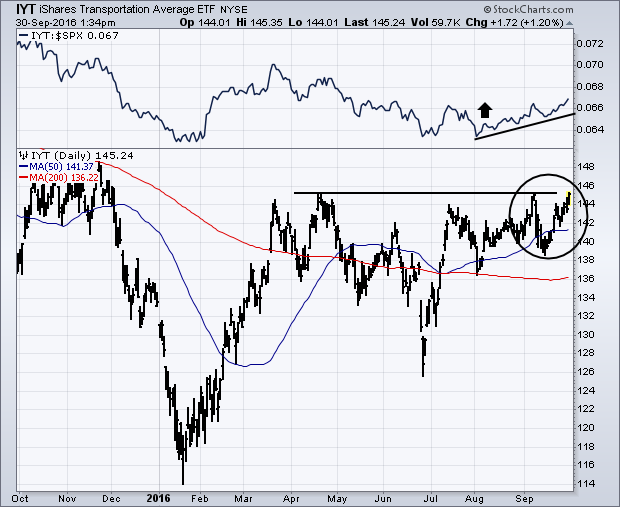
Chart 2 shows the Dow Jones US Railroad Index ($DJUSRR) rising above its October peak to establish a new uptrend. It’s relative strength (solid) line is rising as well. Its 50-day average cleared its 200-day in May. One of the premises of Dow Theory is that transportation stocks should rise with the industrials. Industrials make the goods while transports (like rails) move them to market. The economy (and the market) are stronger when both are moving up together. The rails have already turned up. The entire transportation group is on the verge of doing the same. Chart 3 shows Union Pacific (UNP) also in an uptrend. CSX (not shown) looks the same. Norfolk Southern (NSC) isn’t far behind.
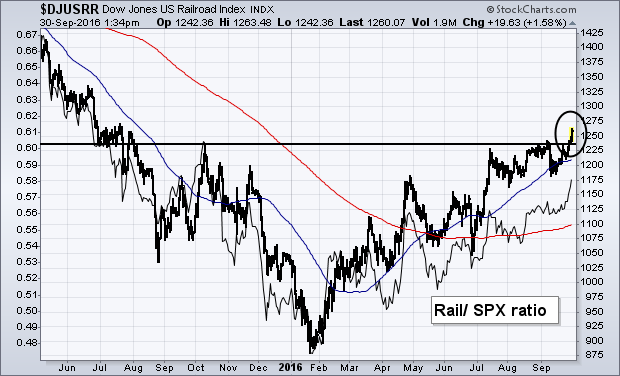
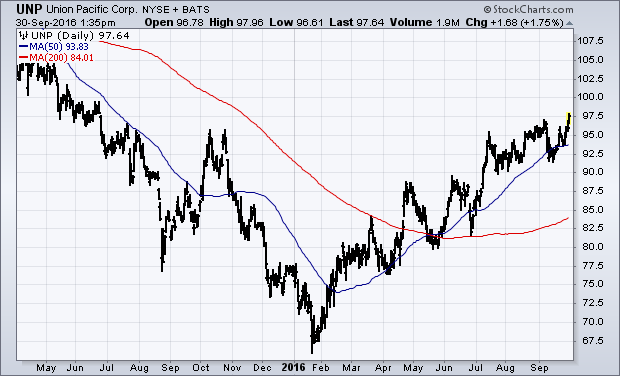
http://stockcharts.com/articles/chartwatchers/2016/10/transports-are-on-the-verge-of-bullish-breakout—-rails-have-already-turned-up.html?curator=thereformedbroker&utm_source=thereformedbroker
4. Traders Predictions on Crude Inventories Not So Good.
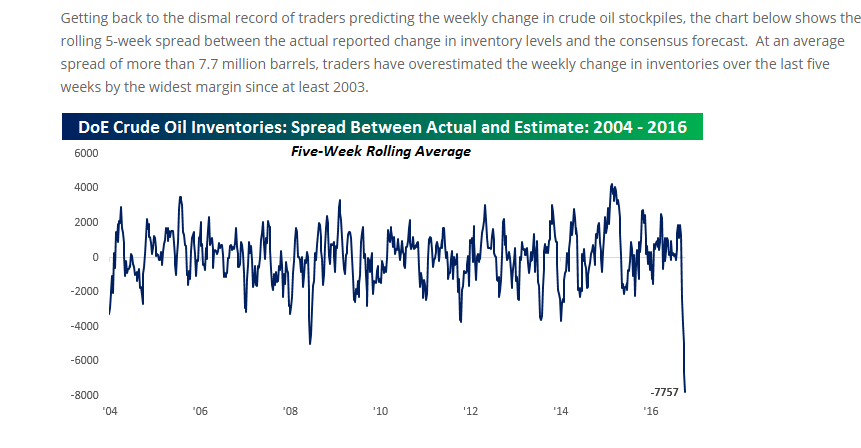
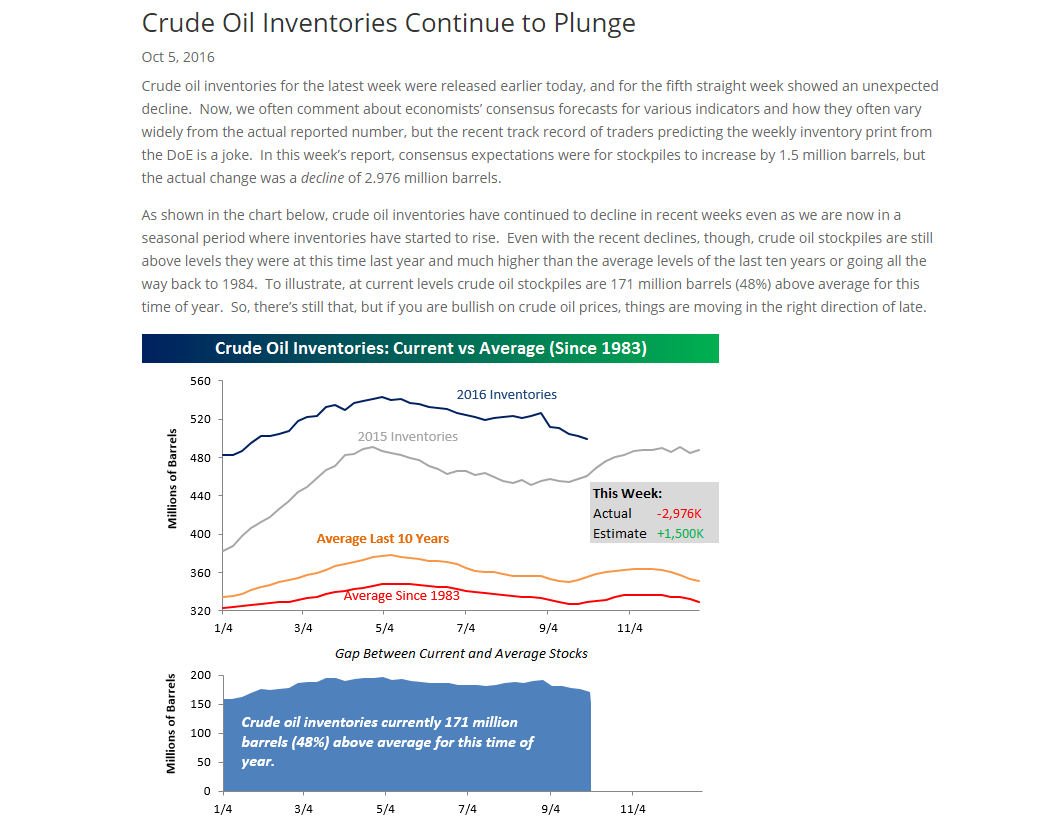
https://www.bespokepremium.com/think-big-blog/
5. U.S. Exports Stop Going Down…Positive for Global Economy?
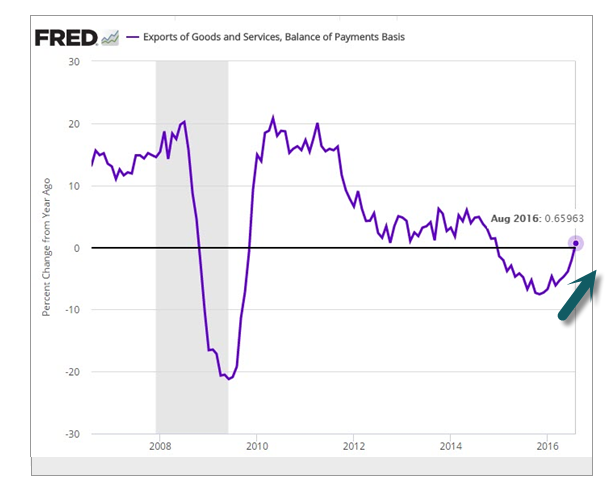
6. Should Rates be Higher?
Rates should be higher because fundamentals are moving higher and US inflation is moving higher, and the Fed is about to raise rates, see the first and second chart below.
The reason why US rates continue to be so low is because of the continued money printing in Europe and Japan, see the third chart
Torsten Slok Deutsche Bank
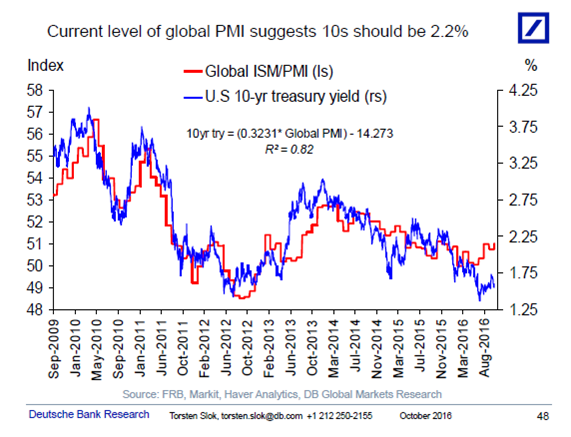
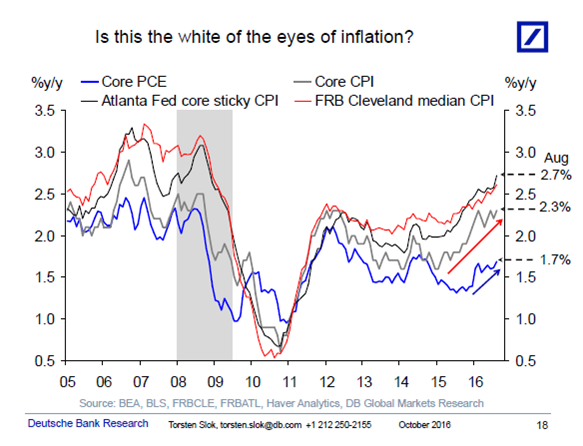
7. Government Investment and Infrastructure Spending are Coming…Back to pre-WWII spending boom levels.
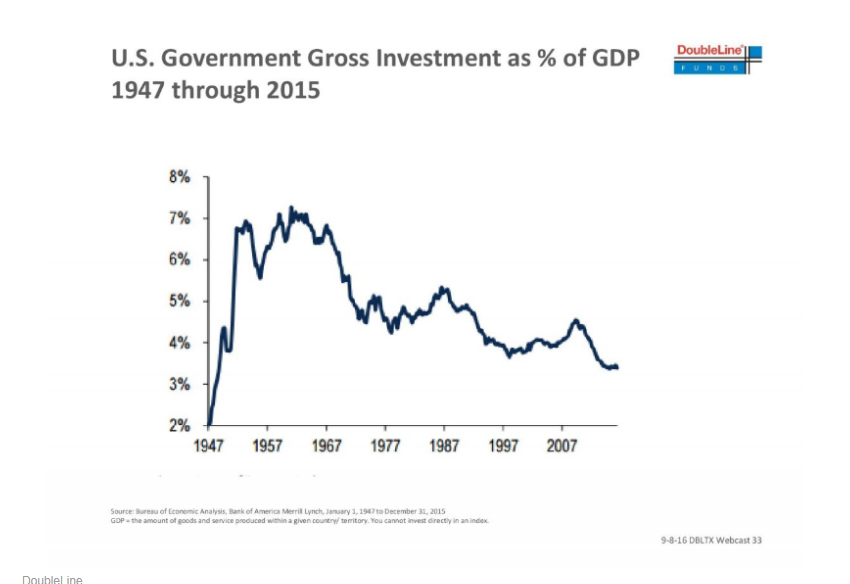
http://www.businessinsider.com/jeff-gundlach-on-fiscal-stimulus-2016-10
8. Read of Day…Ben Carlson
Disconfirmations, Framing & Satisficing
Posted October 2, 2016 by Ben Carlson
I saw a story recently on why New England Patriots head football coach Bill Belichick has been so successful for so long in such an ultra-competitive league as the NFL where coaches typically have a short shelf life.
Belichick was described as a huge fan of Charlie Munger’s ideas on the power of inversion. Instead of looking for ways to win the game he tries to figure out how not to lose. This is a subtle distinction, yet it can be a useful way to find success. Negative knowledge is a highly overlooked aspect of making better decisions.
Robert Cialdini explains in his new book, Pre-Suasion: A Revolutionary Way to Influence and Persuade:
In deciding whether a possibility is correct, people typically look for hits rather than misses; for confirmations of the idea rather than for disconfirmations. It is easier to register the presence of something than its absence.
Cialdini cites how this line of thinking can actually influence how you feel about your own level of happiness. A group of Canadians were asked if they were happy or unhappy in their social lives. People who were asked if they were unhappy — and thus looked for confirmation of that unhappiness — were 375% more likely to declare themselves unhappy as those who were asked if they were happy. The framing of the question changed how people looked at their own lives.
This same idea can also be used increase the likelihood that people will help you when asked. Another study looked at a clipboard-carrying researcher who was trying to get people to talk to them at a shopping mall. When simply approaching people, just 29% of those who were asked to participate in a study agreed. In the next round they changed their opening line to include, “Do you consider yourself a helpful person?” Of course, almost everyone answered yes, leading to a consent rate of almost 80%.
Getting people in the right frame of mind through some minor upfront nudges can also work when trying to sell products on the Internet. A furniture company was having trouble showing that their high quality sofas deserved a higher price tag than their competitors’ more low quality, low cost sofas. So they did a study where they placed fluffy clouds in the background of their website’s landing page to imply how comfortable their couches were. Site visitors placed a higher level of importance on comfort in this case when asked what they were looking for in a sofa and preferred the more comfortable (and higher priced) model than those who didn’t see the clouds.
The amount of data available at our fingertips presents a double-edged sword when trying to make rational decisions. On the one hand, it seems that we have a near endless supply of choices these days in terms of products, brands and information. On the other hand, more choices can lead to paralysis by analysis and actually make our lives harder when we can’t weave our way through the increased complexity involved in any number of decisions.
This can lead even highly placed decision-makers such as corporate executives into taking shortcuts when making big decisions. Since difficult decisions tends to take time and effort, leading to decision fatigue, people often abbreviate the process by taking the first option that sounds reasonable. Cialdini explains what this is called:
This tendency has a quirky name, “satisficing”— a term coined by economist and Nobel laureate Herbert Simon— to serve as a blend of the words satisfy and suffice. The combination reflects two simultaneous goals of a chooser when facing a decision— to make it good and to make it gone — which, according to Simon, usually means making it good enough. Although in an ideal world one would work and wait until the optimal solution emerged, in the real world of mental overload, limited resources, and deadlines, satisficing is the norm.
To bring this whole thing full circle and back to the Belichick gameplan, Cialdini says it’s important for people and organizations to think less about what could go right and more about what could go wrong:
In the excitement of a looming opportunity, decision makers are infamous for concentrating on what a strategy could do for them if it succeeded and not enough, or at all, on what it could do to them if it failed. To combat this potentially ruinous overoptimism, time needs to be devoted, systematically, to addressing a pair of questions that often don’t arise by themselves: “What future events could make this plan go wrong?” and “What would happen to us if it did go wrong?”
I’m constantly fascinated by the decision-making process because that’s what really separates successful firms from unsuccessful firms, successful investors from unsuccessful investors and potentially happy people from unhappy people.
A few thoughts based on Cialdini’s latest book:
- Avoiding mistakes is often more important than seeking brilliance.
- Framing can influence your thought process in both positive or negative ways.
- There are subtle ways in which you can be persuaded to make decisions that you may not be aware of.
- Before the persuasion even begins there are triggers that can cause us to lean in a certain direction in terms of how we view certain decisions.
- In increased awareness of these techniques can help you avoid mistakes and also increase your ability to persuade others.
Source: Pre-Suasion
Further Reading: Cialdini’s 6 Principles of Influences & Persuasion
9. This is Nuts!
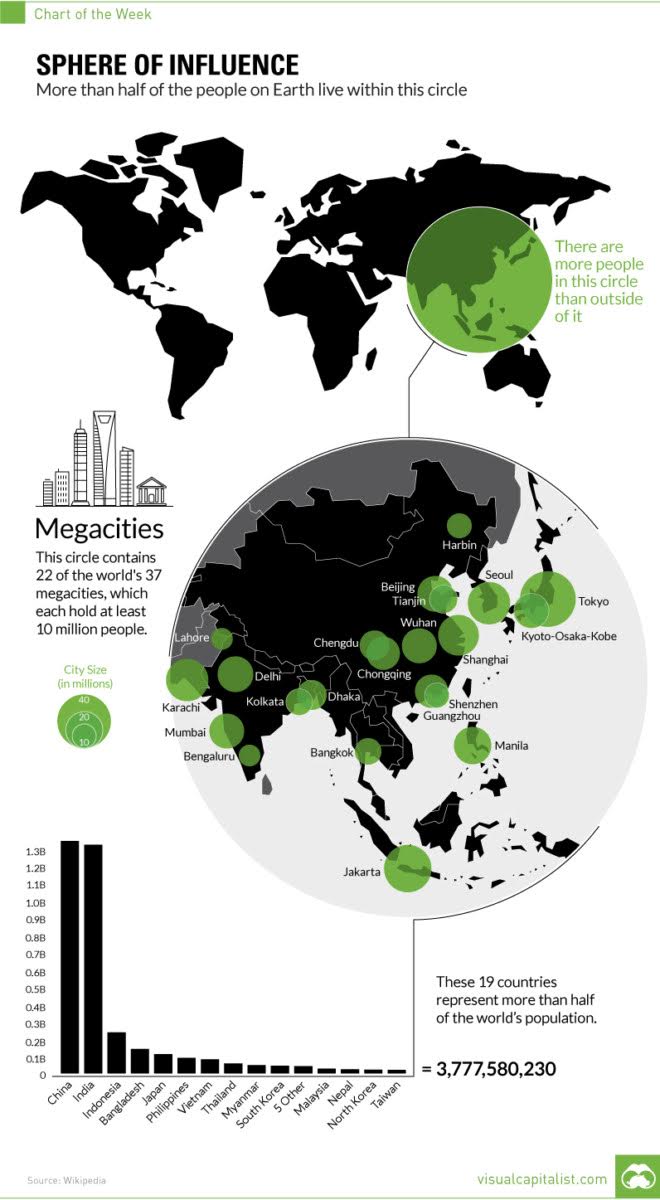
Source: Visual Capitalist
From Barry Ritholtz Blog.
http://ritholtz.com/
10. Always be Useful.
Darius Foroux Follo
The Purpose Of Life Is Not Happiness: It’s Usefulness
For the longest time, I believed that there’s only purpose of life: And that is to be happy.
Right? Why else go through all the pain and hardship? It’s to achieve happiness in some way.
And I’m not the only person who believed that. In fact, if you look around you, most people are pursuing happiness in their lives.
That’s why we collectively buy shit we don’t need, go to bed with people we don’t love, and try to work hard to get approval of people we don’t like.
Why do we do these things? To be honest, I don’t care what the exact reason is. I’m not a scientist. All I know is that it has something to do with history, culture, media, economy, psychology, politics, the information era, and you name it. The list is endless.
We are who are.
Let’s just accept that. Most people love to analyze why people are not happy or don’t live fulfilling lives. I don’t necessarily care about the why.
I care more about how we can change.
Just a few short years ago, I did everything to chase happiness.
- You buy something, and you think that makes you happy.
- You hook up with people, and think that makes you happy.
- You get a well-paying job you don’t like, and think that makes you happy.
- You go on holiday, and you think that makes you happy.
But at the end of the day, you’re lying in your bed (alone or next to your spouse), and you think: “What’s next in this endless pursuit of happiness?”
Well, I can tell you what’s next: You, chasing something random that you believe makes you happy.
It’s all a façade. A hoax. A story that’s been made up.
Did Aristotle lie to us when he said:
“Happiness is the meaning and the purpose of life, the whole aim and end of human existence.”
I think we have to look at that quote from a different angle. Because when you read it, you think that happiness is the main goal. And that’s kind of what the quote says as well.
But here’s the thing: How do you achieve happiness?
Happiness can’t be a goal in itself. Therefore, it’s not something that’s achievable.
I believe that happiness is merely a byproduct of usefulness.
When I talk about this concept with friends, family, and colleagues, I always find it difficult to put this into words. But I’ll give it a try here.
Most things we do in life are just activities and experiences.
- You go on holiday.
- You go to work.
- You go shopping.
- You have drinks.
- You have dinner.
- You buy a car.
Those things should make you happy, right? But they are not useful. You’re not creating anything. You’re just consuming or doing something. And that’s great.
Don’t get me wrong. I love to go on holiday, or go shopping sometimes. But to be honest, it’s not what gives meaning to life.
What really makes me happy is when I’m useful. When I create something that others can use. Or even when I create something I can use.
For the longest time I found it difficult to explain the concept of usefulness and happiness. But when I recently ran into a quote by Ralph Waldo Emerson, the dots finally connected.
Emerson says:
“The purpose of life is not to be happy. It is to be useful, to be honorable, to be compassionate, to have it make some difference that you have lived and lived well.”
And I didn’t get that before I became more conscious of what I’m doing with my life. And that always sounds heavy and all. But it’s actually really simple.
It comes down to this: What are you DOING that’s making a difference?
Did you do useful things in your lifetime? You don’t have to change the world or anything. Just make it a little bit better than before you were born.
If you don’t know how, here are some ideas.
- Help your boss with something that’s not your responsibility.
- Take your mother to a spa.
- Create a collage with pictures (not a digital one) for your spouse.
- Write an article about the stuff you learned in life.
- Help the pregnant lady who also has a 2-year old with her stroller.
- Call your friend and ask if you can help with something.
- Build a standing desk.
- Start a business and hire an employee and treat them well.
That’s just some stuff I like to do. You can make up your own useful activities.
You see? It’s not anything big. But when you do little useful things every day, it adds up to a life that is well lived. A life that mattered.
The last thing I want is to be on my deathbed and realize there’s zero evidence that I ever existed.
Recently I read Not Fade Away by Laurence Shames and Peter Barton. It’s about Peter Barton, the founder of Liberty Media, who shares his thoughts about dying from cancer.
It’s a very powerful book and it will definitely bring tears to your eyes. In the book, he writes about how he lived his life and how he found his calling. He also went to business school, and this is what he thought of his fellow MBA candidates:
“Bottom line: they were extremely bright people who would never really do anything, would never add much to society, would leave no legacy behind. I found this terribly sad, in the way that wasted potential is always sad.”
You can say that about all of us. And after he realized that in his thirties, he founded a company that turned him into a multi-millionaire.
Another person who always makes himself useful is Casey Neistat. I’ve been following him for a year and a half now, and every time I watch his YouTube show, he’s doing something.
He also talks about how he always wants to do and create something. He even has a tattoo on his forearm that says “Do More.”
Most people would say, “why would you work more?” And then they turn on Netflix and watch back to back episodes of Daredevil.
A different mindset.
Being useful is a mindset. And like with any mindset, it starts with a decision. One day I woke up and thought to myself: What am I doing for this world? The answer was nothing.
And that same day I started writing. For you it can be painting, creating a product, helping elderly, or anything you feel like doing.
Don’t take it too seriously. Don’t overthink it. Just DO something that’s useful. Anything.
Still curious?
Hey, I’m Darius Foroux, and thanks for reading this article.
Every Monday and Thursday I publish an article about productivity, life, and business. Feel free sign up for my free newsletter on DariusForoux.com to never miss an article.
